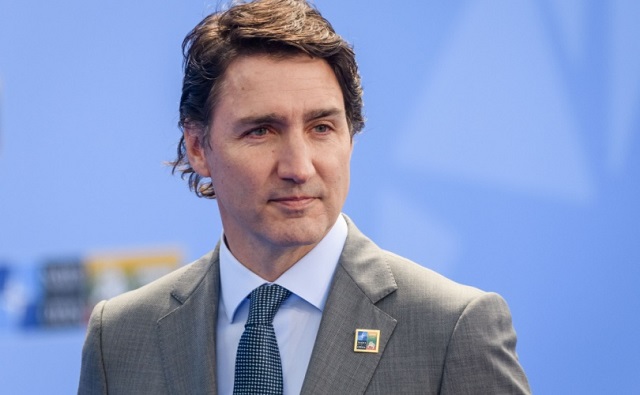Censorship Industrial Complex
Legal group warns Trudeau’s Online Harms Act will ‘weaponize’ courts against Canadians

From LifeSiteNews
” it is likely to exacerbate the problem of social conflict, weaponize the courts and the human rights tribunal for political purposes, and introduce fear into the online social environment “
A Canadian legal group has warned that a Liberal government bill seeking to further clamp down on online speech will “weaponize” the nation’s courts to favor the ruling federal party and do nothing but create an atmosphere of “fear.”
The warning came from the freedom-orientated legal group The Democracy Fund (TDF), which released a 26-page long legal brief going over just how dangerous the Trudeau government’s Online Harms Act, or Bill C-63, is.
“Historically, the power to censor has been a weapon of authoritarian regimes. This power inevitably expands and eventually eliminates the civic process by which society adapts and progresses,” observed TDF in the legal brief.
TDF said it has no “reason to believe this will not happen in Canada.”
“It will not reduce social conflict. On the contrary: it is likely to exacerbate the problem of social conflict, weaponize the courts and the human rights tribunal for political purposes, and introduce fear into the online social environment,” noted TDF.
TDF asserted that as “disturbing as expressions of hateful attitudes” can be, the government should address these issues through “open dialogue and education.”
Bill C-63 was introduced by Liberal Justice Minister Arif Virani in the House of Commons in February and was immediately blasted by constitutional experts as troublesome.
LifeSiteNews reported how the Conservative Party has warned that the bill is so flawed that it will never be able to be enforced nor come to light before the next election.
The law calls for the creation of a Digital Safety Commission, a digital safety ombudsperson, and the Digital Safety Office, all tasked with policing internet content. Its “hate speech” section is accompanied by broad definitions, severe penalties, and dubious tactics, including levying pre-emptive judgments against people if they are feared to be likely to commit an act of “hate” in the future.
Details of the new legislation also show the bill could lead to people jailed for life for “hate crimes” or fined $50,000 and jailed for posts that the government defines as “hate speech” based on gender, race, or other categories.
Censorship Industrial Complex
Pro-freedom group warns Liberal bill could secretly cut off Canadians’ internet access

From LifeSiteNews
“The minister could order this dissident’s internet and phone services be cut off and require that decision remain secret”
Free speech advocates have warned that the Liberals’ cybersecurity bill would allow them to block any individual’s internet access by secret order.
During an October 30 Public Safety committee meeting in the House of Commons, Canadian Constitution Foundation (CCF) counsel Josh Dehaas called for Liberals to rewrite Bill C-8, which would allow the government to secretly cut off Canadians access to the internet to mediate “any threat” to the telecommunications system.
“It is dangerous to civil liberties to allow the minister the power to cut off individual Canadians without proper due process and keep that secret,” Dehaas testified.
“Consider for example a protestor who the minister believes ‘may’ engage in a distributed denial of service attack, which is a common form of civil disobedience employed by political activists,” he warned.
“The minister could order this dissident’s internet and phone services be cut off and require that decision remain secret,” Dehaas continued, adding that the legislation does not require the government to obtain a warrant.
In response, Liberal MP Marianne Dandurand claimed that the legislation is aimed to protect the government form cyberattacks, not to limit freedom of speech. However, Dehaas pointed out that the vague phrasing of the legislation allows Liberals to censor Canadians to counter “any threat” to the telecommunications system.
Bill C-8, which is now in its second reading in the House of Commons, was introduced in June by Minister of Public Safety Gary Anandasangaree and contains a provision in which the federal government could stop “any specified person” from accessing the internet.
The federal government under Prime Minister Mark Carney claims that the bill is a way to stop “unprecedented cyber-threats.”
The bill, as written, claims that the government would need the power to cut someone off from the internet, as it could be “necessary to do so to secure the Canadian telecommunications system against any threat, including that of interference, manipulation, disruption, or degradation.”
Many Canadians, including Conservative MPs and freedom groups, have condemned the legislation, along with several other new Liberal bills which aim to censor internet content as well as go after people’s ability to speak their minds.
“Experts and civil society have warned that the legislation would confer ministerial powers that could be used to deliberately or inadvertently compromise the security of encryption standards within telecommunications networks that people, governments, and businesses across Canada rely upon, every day,” the Canadian Civil Liberties Association wrote in a recent press release.
Similarly, Canada’s own intelligence commissioner has warned that the bill, if passed as is, could potentially be unconstitutional, as it would allow for warrantless seizure of a person’s sensitive information.
Censorship Industrial Complex
Senate Grills Meta and Google Over Biden Administration’s Role in COVID-Era Content Censorship

Lawmakers pressed Meta and Google to explain how far White House outreach went in shaping their censorship decisions.
|
A Senate hearing this week discussed government influence on online speech, as senior executives from Meta and Google faced questions about the Biden administration’s communications with their companies during the COVID-19 pandemic.
The session, titled “Part II of Shut Your App: How Uncle Sam Jawboned Big Tech Into Silencing Americans,” highlighted the growing concern in Washington over what lawmakers describe as government-driven pressure to suppress lawful expression.
Senator Ted Cruz (R-TX), who led the hearing, began by declaring that “the right to speak out is the foundation of a free society” and warning that “censorship around the world is growing.”
He accused the Biden administration of pushing technology companies to restrict Americans’ speech during the pandemic, and he faulted both the companies and Democrats for failing to resist that pressure.
“Today, we pick off where the story left off,” Cruz said, pointing to Meta and Google as examples of firms that “were pressured by the Biden administration to censor the American people.”
He pledged to introduce the Jawbone Act, which he said would “provide a robust right to redress when Americans are targeted by their own government.”
Markham Erickson, Google’s Vice President of Government Affairs and Public Policy, defended the company’s approach, emphasizing that its moderation decisions are guided by long-standing internal policies, not by government direction.
“While we are a company dedicated to the goal of making the world’s information universally accessible, that doesn’t mean that we don’t have certain rules,” Erickson said, citing restrictions on “terrorist content, child sexual abuse material, hate speech, and other harmful content.”
He acknowledged that officials in the Biden administration had contacted Google during the pandemic to urge the removal of certain COVID-19 content from YouTube.
But Erickson maintained that the company “develop[ed] and enforce[d] our policies independently” and “rejected suggestions that did not align with those policies.”
Erickson also alleged that Google has a record of resisting censorship demands from foreign governments, citing its refusal to remove politically sensitive videos in Russia despite threats of imprisonment against employees and fines “that exceed more than the world’s GDP.”
Neil Potts, Meta’s Vice President of Public Policy, took a more reflective stance.
He reiterated that Meta has a “foundational commitment to free expression” and acknowledged that the company had yielded to “repeated pressure” from the Biden White House to restrict COVID-related posts, including satire and humor.
“We believe that government pressure was wrong and wish we had been more outspoken about it,” Potts said. He added that Meta “should not compromise our content standards due to pressure from any administration in either direction.”
Potts pointed to policy changes the company has made since then, such as ending its third-party fact-checking program, reducing restrictions on political topics, and adopting what he described as “a more personalized approach to political content.”
These steps, he said, were intended to “return to our ideals about free expression” and “allow for more speech.”
Senator Cruz pressed both executives on whether their companies regretted complying with government demands.
Potts responded that Meta “do[es] regret our actions for not speaking out more forcefully.”
Erickson, however, declined to use similar language, saying Google regularly receives “outreach from a lot of actors” and evaluates flagged material independently.
The exchange grew more pointed as Cruz questioned Google’s removal of a YouTube video that compiled election-fraud claims made by both major parties. Erickson conceded, “Yes, that is news,” when Cruz asked whether statements by presidential candidates about election integrity should be considered newsworthy.
But Erickson defended YouTube’s policies during the 2020 election, saying that after states had certified results, the company acted against “claims of widespread fraud” due to potential “real-world harm.”
Cruz accused Google of ideological bias and suggested the company was “unwilling to express regret for anything at all.”
He contrasted that with Meta’s statement of remorse and concluded that Google’s position reflected “a level of contempt for free speech that does not reflect well.”
Where Erickson had insisted that Google “continued to develop and enforce our policies independently,” the company’s letter to Congress acknowledged that “Senior Biden Administration officials, including White House officials, conducted repeated and sustained outreach” urging the removal of COVID-19 content that did not violate platform rules.
This was somewhat of a departure from the defensive posture Google maintained before the Senate.
|
|
|
|
You read Reclaim The Net because you believe in something deeper than headlines; you believe in the enduring values of free speech, individual liberty, and the right to privacy.
Every issue we publish is part of a larger fight: preserving the principles that built this country and protecting them from erosion in the digital age.
With your help, we can do more than simply hold the line: we can push back. We can shine a light on censorship, expose growing surveillance overreach, and give a voice to those being silenced.
If you’ve found any value in our work, please consider becoming a supporter.
Your support helps us expand our reach, educate more people, and continue this work.
Please become a supporter today.
Thank you for your support.
|
-

 Environment2 days ago
Environment2 days agoThe era of Climate Change Alarmism is over
-

 Aristotle Foundation2 days ago
Aristotle Foundation2 days agoB.C. government laid groundwork for turning private property into Aboriginal land
-

 Bruce Dowbiggin23 hours ago
Bruce Dowbiggin23 hours agoA Story So Good Not Even The Elbows Up Crew Could Ruin It
-

 Alberta24 hours ago
Alberta24 hours agoCanada’s heavy oil finds new fans as global demand rises
-

 Addictions22 hours ago
Addictions22 hours agoThe War on Commonsense Nicotine Regulation
-

 Daily Caller11 hours ago
Daily Caller11 hours agoTrump Reportedly Planning Ground Troops, Drone Strikes On Cartels In Mexico
-

 Health21 hours ago
Health21 hours agoRFK Jr’s argument for studying efficacy of various vaccines
-

 Business1 day ago
Business1 day agoCarney government should retire misleading ‘G7’ talking point on economic growth



